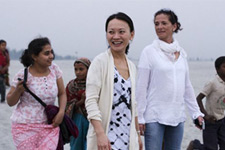Mission of mercy: Dr. Toni Zhong, MD’02

Spearheading humanitarian surgical missions to developing countries, alumna Dr. Toni Zhong, MD’02, is featured in a video that recently won an award from the News Photographers Association of Canada.
Joined by a team of medical experts and fellow plastic surgeons from Women for Women, the video focuses on Dr. Zhong’s work performing reconstructive surgery on burn victims in Bangladesh.
Speaking about the motivations behind her outreach work in a Toronto Star article, Dr. Zhong said, “I feel a great sense of responsibility to provide surgeries to the patients who have been waiting for days and travelled so far to get here. Plastic surgeons can make a real difference in people’s lives.”
Read more about Dr. Zhong’s work and watch the video here.
In this Q&A, Dr. Zhong discusses how she became involved with Women for Women, why she thinks humanitarian missions can ‘awaken’ physicians’ practise and the advice she has for others looking to volunteer their expertise in a similar fashion.
When did you first become involved with Women for Women (WfW) and why were you drawn to this organization?
I participated in the first WfW surgical mission in 2011. I was drawn to it after I heard an incredibly moving presentation given by the Founder of this organization, Dr. Connie Neuhann-Lorenz, at an International Plastic Surgery Conference earlier that year. I actually sought her out during the conference, tagged along with her for the remainder of the day and learned all about this organization. I liked their mission statement, and as a female surgeon, I could identify with the female patient population. I made her promise to contact me when she was gearing up for the next surgical mission. Four months later, we went on our first surgical mission together to Bangladesh.
Why is being involved in humanitarian surgical missions so important to you?
Volunteerism and giving back is important for me, and it should be for all of us fortunate to live in Canada and benefit from the Canadian universal health care system. This is a lesson that I am trying to impart upon my kids right now (my oldest is five years old). As a physician, I think that it is also important for those of us who have become comfortable in our practice to go and ‘awaken’ our senses—it helps to ward off the ‘empathy drain’ that tends to seep in.
In the Toronto Star article you are featured in, you mention drawing inspiration from your late father’s (Dr. Robert Zhong) work as a surgeon in rural China during the Cultural Revolution. What type of impact has your father had on your decision to engage in humanitarian missions?
My father’s work had a tremendous impact on all of my professional decisions, whether or not I recognized it at that time. I decided to join the University Health Network to be an academic surgeon because my father was a surgical scientist and pioneered much of the transplant research at Schulich Medicine & Dentistry, along with Dr. Bill Wall and Dr. Calvin Stiller in the early 1980’s. His stories about his earlier volunteer work as a grassroots doctor in rural China during the Cultural Revolution were so impactful on me growing up that invariably I absorbed them and wanted to experience this first hand.
Before embarking on your first humanitarian mission, did you have any particular expectations?
I think that I was both very excited and nervous before the first mission. I have participated in surgical missions before as a plastic surgery resident and have been on cleft lip and palate repair missions.
What was most nerve-wracking for me was when I led my first surgical mission in 2016. As the team leader I had to ensure we went with all of our medical supplies, surgical equipment, dressings and medicines for the post-operation care. There was a lot of paperwork, visas, applications and forms that I had to fill out for each team member to ensure that our surgical mission could be successfully carried out. It took months of preparation and hundreds of emails to organize each trip.
How has being involved in humanitarian missions influenced your professional motivations and professional development?
Participating in humanitarian surgical missions has made me a better person in general, and a better physician to my patients. As well, I learned a lot about being a leader of an entire team, and about the importance of exercising sound clinical judgement with respect to patient selection for surgery, and looking after the key perioperative details to ensure patient safety—which are typically roles filled by other personnel in our home environment.
What advice would you give to other residents or doctors looking to embark on a medical-centred humanitarian mission?
My advice number one advice is to don’t let the unknown stop you from experiencing it. As long as you are going with a reputable group with a known track record and to a location where your personal safety is ensured, then take the chance and do something out of your comfort zone. Your reward is that you will definitely learn a lot about yourself and realize your capabilities.
To date, what is the most rewarding or satisfying moment you have encountered through your humanitarian missions?
There are many….With the WfW organization, I have built friendships and bonds with other female team memberships from our surgical missions that will last a life-time. We look forward to planning and executing our surgical missions together annually. Many of us on the WfW team, we tend to go back to the same place each year, so that we can provide continuity of care and build meaningful relationships with the locals. For me, when I go back, it is always extremely gratifying to learn when a previous patient of mine who could not previously function independently because of a burn deformity can now perform those tasks and contribute to her community.
